(8) Food Security Note 44 and Nutrition
The number of chronically undernourished people in the world is estimated at 687.8 million (approximately one in 11 people in the world) in 2019, according to the “State of Food Security and Nutrition in the World report 2020” jointly prepared and published by the Food and Agriculture Organization of the United Nations (FAO), the International Fund for Agricultural Development (IFAD), the World Food Programme (WFP), the United Nations Children’s Fund (UNICEF), and the World Health Organization (WHO). Although the number of chronically undernourished people had been on a declining trend for more than 10 years until 2014, it has risen by over 60 million people since the trend was reversed in 2015. In order to achieve Goal 2 of the SDGs, “End hunger, achieve food security and nutrition improvement, and promote sustainable agriculture,” it is vital to put in greater effort. Furthermore, although a provisional estimate, the possibility of a further 80 million to 130 million people falling into malnutrition has been pointed out as a result of the economic decline caused by the spread of COVID-19. Hence, there are calls around the world to accelerate and expand action toward strengthening resilience and adaptability against this grave food crisis.
In order to ensure food security, there is a need for multifaceted measures based on international coordination. These measures include not only a sustainable increase in the production of food, but also improvement of nutrition, establishment of a social safety net, provision of necessary food assistance, and implementation of countermeasures against pests and infectious diseases among livestock. Improving the nutritional status during the first 1,000 days from pregnancy to the child’s second birthday is said to be particularly important as it has a significant impact on the child’s long-term growth thereafter.
Moreover, since many of the poor in developing countries live in the rural area and the majority depend on agriculture for their livelihoods, it is also important to tackle the development of agriculture and farming communities. Furthermore, many farmers in developing countries are unable to sell their agricultural products at a high price, and this, among other factors, makes it difficult for them to get out of poverty. Thus, one of the proposed solutions for this is to build a food value chain. This is an initiative in which many stakeholders, including the farmers, suppliers of the necessary farming implements such as seeds, fertilizers, and farming machinery, processing companies of agricultural produce, transportation and distribution companies, and retailers, cooperate to create a chain that can enhance the added value of agricultural produce from the stages of production, to manufacturing and processing, distribution, and consumption. Specifically, the added value of agricultural produce includes improving the quality of products, developing attractive new products, reducing transportation costs, increasing sales opportunities by expanding the sales network, and other activities.
●Japan’s Efforts
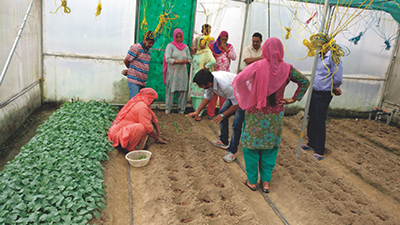
Local extension workers for vegetable farming and processing giving technical instruction to farmers in Mandi District, Himachal Pradesh, India (Photo: JICA)
Japan proactively addresses food-related problems as a global issue, giving priority to cooperation for the promotion of agriculture, forestry, and fisheries, including the development of food value chains. In the short term, Japan provides food assistance to developing countries to avert food shortages, and in the medium to long-term, it aims to help increase and improve agricultural production and productivity in developing countries in order to prevent and eliminate the causes of food-related problems including hunger. As its medium to long-term support, specifically, Japan uses its knowledge and experience to strengthen research and technology development along with capacity building in disseminating this technology in a way that is suited to the cultivation environment, promote the sustainable use of fishery resources, strengthen organizations of farmers, and assist in policymaking, as well as to improve infrastructure such as irrigation facilities, farm roads, and fishing ports.
... Efforts to Provide Food Assistance and Improve Nutrition
Japan is providing food assistance based on requests from developing countries confronting food shortages. In FY2019, Japan contributed a total of ¥4.05 billion as bilateral food aid in 13 countries and provided approximately 680,000 tons of grains (rice and wheat), which mainly included Japanese government rice.
Moreover, in cooperation with WFP, Japan provided ¥352 million in grant aid to the Nuwakot District in Nepal for the construction of facilities to provide school meals by adopting a “local production for local consumption” system for ingredients, capacity building for spreading school meals, and nutrition education trainings for local residents.
In addition to bilateral support, Japan, in cooperation with international organizations, is also engaged in efforts to provide food assistance from the perspective of preventing the occurrence and recurrence of conflicts, which is a cause of starvation. For example, through WFP, Japan implements measures such as emergency food assistance and school feeding programs to improve access to education, as well as food assistance to support the self-reliance of local communities by encouraging people, through the distribution of food, to participate in the development of agricultural land and social infrastructure. In 2019, WFP conducted activities including the distribution of approximately 4.2 million tons of food to approximately 97.1 million people in 83 countries around the world. In 2019, Japan contributed a total of $156.93 million to WFP projects.
As for initiatives for nutritional improvement as well, in addition to bilateral assistance for the promotion of breastfeeding and the training of health professionals, Japan also provides assistance through multilateral cooperation by contributing to organizations such as UNICEF and WFP. Japan also participates in the international nutritional improvement initiative, Scaling Up Nutrition (SUN), as a donor country. In recent years, Japan is also putting effort into promoting nutritional improvement programs in collaboration with private companies and launched the Nutrition Japan Public Private Platform (NJPPP) in 2016. Through this platform, in cooperation with partners from private companies, civil society, and academic research institutions, Japan contributes to nutrition improvement specifically by creating an environment that can boost initiatives of Japanese food-related enterprises, etc. for nutritional improvement in developing countries.
Additionally, at TICAD VI, Japan launched the Initiative for Food and Nutrition Security in Africa (IFNA) with the aim of accelerating nutrition improvement in Africa, and announced Japan would extend IFNA’s experience and knowledge throughout the African continent to improve the nutrition of 200 million children under the age of five in Africa at the TICAD7. In this way, efforts led by Japan have been getting underway in earnest to improve nutrition.
Viet Nam Public nomination
Collaboration Program with the Private Sector for Disseminating Japanese Technology for National Nutritionist Qualification System
JICA’s SDGs Business Supporting Surveys*1 (Collaboration with the “Vietnam Nutrition System Establishment Project (VINEP)” by Ajinomoto Co., Inc.) (April 2014 – June 2016)
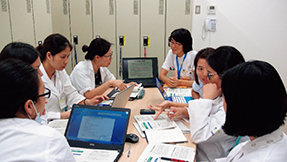
Vietnamese dietitians as interns learning from dietitians at Kyoto University Hospital (Photo: The Ajinomoto Foundation)
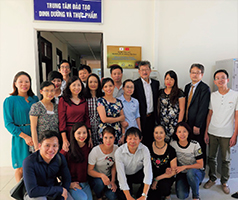
Healthcare workers studying nutrition and project experts at the Nutrition Training Center of the National Institute of Nutrition of Viet Nam (Photo: The Ajinomoto Foundation)
While Viet Nam has experienced remarkable growth in recent years and is becoming more affluent, health problems such as overnutrition (obesity, etc.) and a rapid increase in non-communicable diseases are beginning to appear. For this reason, there is a growing need to train dietitians who can provide accurate nutritional knowledge to the public.
In response to this situation, in 2011, Ajinomoto Co., Inc. launched the “Vietnam Nutrition System Establishment Project”*2 with the National Institute of Nutrition of Viet Nam, and a four-year dietitians training course was started at Hanoi Medical University in 2013. The Japan Dietetic Association, Jumonji University, Kanagawa University of Human Services, and others cooperated in the project, and the first 43 dietitians were fostered in Viet Nam in 2017.
In addition, through JICA’s SDG Business Supporting Surveys, the company invited officials from the government, universities, and hospitals involved in systems related to nutrition, as well as dietitian training course instructors and students, to Japan for training. Moreover, based on the knowledge learned in Japan and what they experienced during site visits, the participants held a “Nutrition Symposium” in Viet Nam to convey the importance of nutrition management and national nutrition policy. Thanks to such efforts, dietitians were legally recognized as a civil service profession in 2015, laying the groundwork for a system to further develop the discipline.
The company continued to support the project, providing internship programs and local workshops in the field of clinical nutrition*3. Furthermore, the Ajinomoto Foundation has been continuing this project since 2017, and the number of universities training dietitians has now been increased to nine. The Minister of Health of Viet Nam mentioned at the workshop that “500 dietitians in five years” would be trained, and various forms of support are being provided to achieve this goal.
In order for the newly fostered dietitians to play an active role in improving the health of people in Viet Nam, the education system still needs to be improved. The Ajinomoto Foundation is supporting the creation of a sustainable education system that will enable dietitians to play an active role.
*1 Collaboration Program with the Private Sector for Disseminating Japanese Technology for the Social and Economic Development (currently: SDGs Business Verification Survey with the Private Sector (SDGs Business Support Type))
*2 Vietnam Nutrition system Establishment Project (VINEP)
*3 Projects of Global Extension of Medical Technologies (2015, 2017)
Awarding of the 2020 Nobel Peace Prize to World Food Programme (WFP)
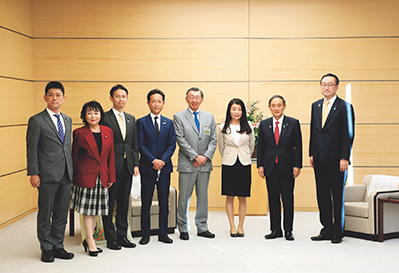
Prime Minister Suga receiving a courtesy call and report of winning the Nobel Peace Prize from the WFP Japan Relations Office, the Japan Association for the WFP, and the WFP Parliamentary League (Photo: Cabinet Public Affairs Office of the Government of Japan)
On October 9, 2020, WFP was awarded the 2020 Nobel Peace Prize. WFP is a UN organization established in 1961 to implement emergency food assistance, etc.
Prime Minister Suga and Foreign Minister Motegi each sent out messages expressing their congratulations for the award. In the messages, along with showing their profound respect for the WFP staff responding to the COVID-19 pandemic day in and day out while the world faces such an unprecedented crisis, they expressed their high appreciation for WFP’s abundant experience in addressing humanitarian crises as the sole UN agency delivering food assistance, as well as their intent to continue to strongly support WFP’s efforts (see also “Japanese Personnel Playing Active Roles in International Organizations across the World” in Part I regarding the activities of Japanese WFP staff).
... Tokyo Nutrition for Growth Summit 2021
Positioning nutrition as an important basic area for achieving UHC, Japan as the host country of the Tokyo 2020 Olympic and Paralympic Games will hold the Tokyo Nutrition for Growth Summit 2021 in December 2021. Through this summit, Japan aims to promote global initiatives for improving nutrition.
At the Summit, discussions on various topics related to nutrition will be conducted with a large number of stakeholders in order to resolve challenges. Specifically, the following five themes are planned to be discussed: integrating nutrition to UHC, building healthy and sustainable food systems, addressing malnutrition in fragile and conflict affected contexts, promoting data-driven accountability, and securing financial resources for improving nutrition (see pages “Promotion of UHC (Japan’s Initiatives at International Conferences)” to “Promotion of UHC (Japan’s Specific Contributions)” for details on UHC).
... Establishment of Food Value Chains and Promotion of Agriculture, Forestry, and Fisheries
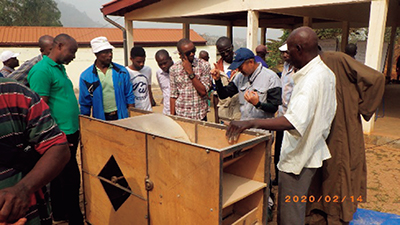
A Japanese expert giving an explanation on a fanning mill during a training on the post-harvest processing of upland rice in Yaounde, the capital city of Cameroon
Japan is promoting the establishment of food value chains for developing countries through public-private partnership. In December 2019, Japan formulated the “Plan to Promote the Establishment of Global Food Value Chain,” which stipulates priority initiatives for building food value chains in countries and regions throughout the world, and in FY2020, organized bilateral policy dialogues based on the plan with Viet Nam, Thailand, and other countries.
Moreover, with the aim of realizing food security and eradicating poverty in Africa, Japan places emphasis on agriculture as an industry that plays an important role in Africa’s economic growth, and contributes to its development. For instance, Japan supports the research of NERICA (New Rice for Africa)*, a cross-breed between Asian rice and African rice, and the spread of its production techniques, as well as support for increasing rice production based on the Comprehensive Africa Agriculture Development Programme (CAADP).
Furthermore, at TICAD7 in 2019, Japan announced the launch of the Coalition for African Rice Development (CARD)* 2nd phase in order to achieve a goal of further doubling rice production in Sub-Saharan Africa (from the 2018 goal of 28 million tons to 56 million tons by 2030). Under CARD 2nd phase, efforts are strengthened toward doubling rice production by increasing the number of eligible recipient countries from 23 to 32 and adopting the RICE (Resilience, Industrialization, Competitiveness, Empowerment) approach* including efforts for enhancing the quality of locally-produced rice.
Moreover, in order to promote the transition from self-sufficient agriculture to income generating agricultural activities, Japan has provided training for 18,013 technical instructors and 183,042 smallholders from 29 countries, including non-African countries, toward the promotion of market-oriented agriculture through the Smallholder Horticulture Empowerment & Promotion (SHEP) approach* by the end of 2019.
In addition, in response to requests from African countries at TICAD VI for greater cooperation in the agricultural sector, Japan has launched a platform that connects African countries and Japan. Through this platform, Japan dispatched seven experienced experts from 2019 to 2020 to carry out the transfer of outstanding agricultural technology and advance human resources development as well as to promote excellent projects in the agricultural sector.
Morocco
Dispatch of JICA Expert on Development of Maritime Fisheries
Individual Expert (May 2017 – January 2020)
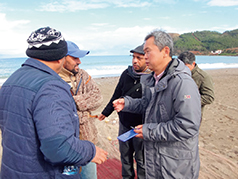
Mr. Sugiyama visiting a fishing village to observe their situation through conversations with fish workers (Photo: JICA)
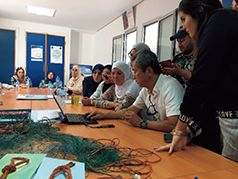
Mr. Sugiyama exchanging ideas about local products with a women’s union (Photo: JICA)
Japan and Morocco have a long history of cooperation in the development of the fisheries sector, dating back 40 years. Japan has provided multifaceted support including the development of fisheries infrastructure, promotion of coastal fisheries, fisheries education, and research on fisheries resources. Today, Morocco’s fisheries sector has come to boast one of the largest catches in Africa, with fisheries products accounting for about 10% of the country’s total export value. The sector, including related industries, also provides employment to as many as approximately 660,000 people. On the other hand, there are still many small-scale fishers who are in a socially and economically vulnerable position.
In response to this, JICA expert Mr. SUGIYAMA Shunji was dispatched as a fisheries development expert to the Moroccan Department of Marine Fisheries, Ministry of Agriculture, Fisheries, Rural Development, Water and Forests in May 2017.
In order to understand the reality of small-scale fisheries, Mr. Sugiyama and his colleagues from the Department spent several months visiting approximately 23 fishing villages scattered along the coast. They listened to the fish workers explaining their severe conditions and held on-site discussions with them on various possibilities such as the development of local products, cooperation between the tourism and fishery sectors, and the participation of women’s groups. They compiled the results into a proposal and submitted it to the Government of Morocco. The proposal included plans to improve income opportunities for small-scale fishers through the production of bottled sardines or cultivation of mussels, as well as initiatives for the cooperation among the fishing ports, fisheries cooperative-run restaurants, direct sales stands for fisheries products, etc., in order to attract tourists from Western countries. They also provided technical training for direct sale of fisheries products.
In addition, Morocco is utilizing the experience in developing fisheries infrastructure, etc., learned from Japan to advance South-South cooperation*2 with Sub-Saharan African countries. Mr. Sugiyama is also encouraging such activities in Morocco to promote cooperation for the development of the fisheries sector across the entire Africa region.
The proposal was compiled as a framework for the concrete implementation of a “Blue Economy (BE)”*2 designed for the sustainable development of Morocco’s fisheries sector, and through this project, Japan gained an experience in providing support in the new field of the BE. In this way, Japan and Morocco are steadily advancing a new initiative that is beneficial to both countries.
*1 See the glossary.
*2 The blue economy aims both for the conservation of marine resources and economic development through the sustainable use of resources in the sea, rivers, lakes, and other water areas. This concept involves diverse stakeholders in the goal of economic development through the effective use of local marine and fishery resources. It has come into the spotlight in recent years, and there are high hopes for the initiative not only in Morocco but in other African countries. Japan’s experience in fisheries product processing and product development can be utilized.
... Food Security through a Multilateral Cooperation Approach
Under the Responsible Agricultural Investment (RAI)* initiative, the Principles for Responsible Agricultural Investment (PRAI) were formulated by FAO, IFAD, the United Nations Conference on Trade and Development (UNCTAD), and the World Bank, while the Principles for Responsible Investment in Agriculture and Food Systems (CFS-RAI) were adopted at the Committee on World Food Security (CFS) in 2014. Japan, in cooperation with relevant international organizations, promotes efforts for conducting research to facilitate RAI and initiatives to share good practices in order to raise awareness and promote understanding at the regional level.
The G7 also announced the “G7 Vision for Action on Food Security and Nutrition” at the G7 Ise-Shima Summit in 2016. In response to the G7 Vision for Action, Japan works on the following priority areas to achieve the target by 2030: empowering women, improving nutrition through a people-centered approach, and ensuring sustainability and resilience within agriculture and food systems.
Furthermore, Japan has been involved in initiatives such as providing assistance to the Agricultural Market Information System (AMIS) in the G20, which aims to enhance the transparency of the international agricultural market. It is an inter-organizational platform launched in 2011 by the G20 as a measure to counter the wild fluctuations of food prices, and the G20 member countries, major importing and exporting countries, corporations, and international organizations utilize it to share information on the agricultural and food market (such as production volumes and prices) in a timely, accurate, and transparent manner. Japan has provided project costs to AMIS, while sharing information about Japan, to contribute to the enhancement of food security.
Japan also provides assistance in the agricultural sector to enable developing countries to strengthen their own foundations for food production through international organizations such as FAO, IFAD, Consultative Group on International Agricultural Research (CGIAR), and WFP, while also making contributions to the enhancement of animal hygiene through the World Organisation for Animal Health (OIE) and FAO. For example, Japan has provided assistance in technical cooperation for the agricultural and rural development of developing countries, the establishment of international standards and norms in the food and agriculture fields, and the development of statistics, etc. through FAO. In addition, Japan provides support for research on the variety development conducted by CGIAR, which is comprised of 15 agricultural research institutions, and promotes collaboration with CGIAR through exchanges among researchers. Concerning transboundary zoonotic diseases such as foot-and-mouth disease and African Swine Fever (ASF), Japan is contributing to enhancing animal hygiene in the Asia-Pacific region, in cooperation with the OIE and FAO, through active contributions to the Global Framework for Progressive Control of Transboundary Animal Diseases (GF-TADs), which was established by those two organizations (see also “Master Techniques from Japan to the World”).
- *New Rice for Africa (NERICA)
- NERICA is a general term for rice developed in 1994 by the Africa Rice Center (formerly West Africa Rice Development Association [WARDA]) through the hybridization of high-yield Asian rice with African rice, which is resistant to weeds, diseases, and insect pests. In order for NERICA to suit the natural conditions of each region in Africa, they are characterized by (i) a higher yield, (ii) a shorter growth period, (iii) higher resistance to dryness (drought), and (iv) higher resistance to diseases and insect pests than conventional rice. Since 1997, Japan has partnered with international organizations and NGOs to provide support for research and development related to new types of NERICA, test cultivation, and increased production and popularization of seeds. In addition, Japan has dispatched agricultural experts and JOCVs to offer cultivation training and has also accepted trainees from Africa for training in Japan.
- *Coalition for African Rice Development (CARD)
- CARD is a consultative group composed of donor countries, African regional organizations, and international organizations, partnered with rice-producing countries in Africa that are interested in rice production and development. It was proposed and launched by Japan at the TICAD IV in 2008 to support self-help efforts toward the expansion of rice production in Africa.
- *Resilience, Industrialization, Competitiveness, Empowerment (RICE) approach
- An initiative adopted under CARD 2nd phase to realize the goal of doubling rice production in Sub-Saharan Africa. Specific efforts include stabilizing production through adaption to climate change and population growth, industrial formation in local areas in cooperation with the private sector, enhancing the quality of home-grown rice so that it can compete with imported rice, and the establishment of agricultural management systems for improving the household incomes and livelihoods of farmers.
- *Smallholder Horticulture Empowerment & Promotion (SHEP) approach
- The SHEP approach refers to an effort to assist smallholder farmers producing fruits, vegetables, and other produce and was started by Japan in Kenya in 2006, aimed at increasing their income by causing a mindset shift from “selling after growing” to “growing to sell” and through improvements to farm management and cultivation skills. Japan is supporting the adoption of SHEP around the world with a focus on Africa, pledging its wide expansion to African countries and human resources development (1,000 technical instructors and 50,000 smallholder organization members) at the TICAD V in 2013.
- *Responsible Agricultural Investment (RAI)
- RAI is an initiative that aims to maximize the interest of local residents and communities including farmers and investors, as well as minimize the risks to both sides, by balancing between the responses to the need to increase agricultural investment for reducing severe poverty in rural areas of developing countries and the responses to the unintentional negative impact of agricultural investment, such as a threat to food security and various rights including land ownership of the local people based on the need for increased global food production and sharp rises in international food prices. It was proposed by Japan at the G8 L’Aquila Summit (Italy) in 2009.
- Note 44: A state where all people, at all times, can access sufficient, safe, and nutritious food.
